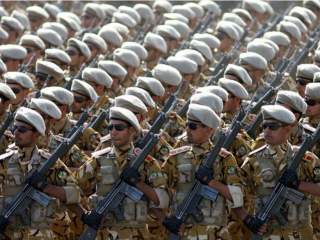Iran Steals a Strategy From Israel's Playbook
Israel's early days are a model—albeit unsuccessful—for Tehran today.
Just about the only thing going right for Iran right now is the continued implementation of last July’s nuclear deal, which is expected to yield sanctions relief for the Islamic Republic within days. Yet even this backlights the shortcomings of Iran’s periphery approach compared to Israel’s. Periphery-era Israel enjoyed close relations with major global powers, close enough that one helped its nuclear program and the other resupplied it in the midst of a major war and protected it from an unfriendly superpower. Periphery-era Israel also developed its own nuclear deterrent. The nuclear deal kicks the prospect of an Iranian bomb down the road several years, and it merely removes obstacles to great-power relationships, rather than building them. Iran does not have any deep, trusting great-power partners, and even if it did, years of underinvestment in major industries, critical infrastructure and high-end military capabilities (like the air force) must be addressed before Iran can approach anything like Israel-style unilateral power.
So Iran’s appropriation of Israeli strategy isn’t going too well, even as it faces many of the strategy’s downsides. And the subtler problems that faced Israel may someday visit Iran, too. Alpher notes that there is “a school of thought in Israel that argues that the periphery strategy, precisely because it gave Israel a much-needed sense of security, prevailed at the expense of a strategy for seeking peace with Israel’s Arab enemies.... As Professor Shimon Shamir, a former Israeli ambassador to Cairo and Amman, argues, ‘all our activity in the non-Arab sphere was seen [by the Arabs] as subversion and as proof of [Israel’s hostile] historical mission.’”
That’s certainly true of Iran today—its penchant for underhanded tactics have led many in Israel, America and the Arab world to see any Iranian presence as nefarious. And the tools of Iran’s present strategy are obstacles to peace in the future. As long as Iran sponsors Hezbollah, a core element of its periphery doctrine, it will never have regular relations with the United States, which designates Hezbollah a terror group and therefore designates Iran a sponsor of terror. Iranian-backed militias in Iraq and Syria, while useful now for projecting influence and keeping ISIS away from Iran’s borders, have sharpened the sectarian character of the conflicts, making peace there and normal relations with Sunni powers elsewhere less likely in the future. For some hardline factions in Iran, this permanent confrontation, this diplomatic-war-until-victory approach, is an acceptable outcome. Yet for those in Iran who would prefer detente or even friendship with the outside world, who would like Iran to become a normal country in a normal time, that’s bad news. The sanctions relief Iran is likely to receive in the next few days might not be the cure, but the painkiller that masks Iran’s disease. True recovery, in the form of strategic adjustment, will have to wait.
John Allen Gay, an associate managing editor at The National Interest, is coauthor of War with Iran: Political, Military, and Economic Consequences (Rowman and Littlefield, 2013). He tweets at @JohnAllenGay.
Image: Wikimedia Commons/Reza Dehshiri

